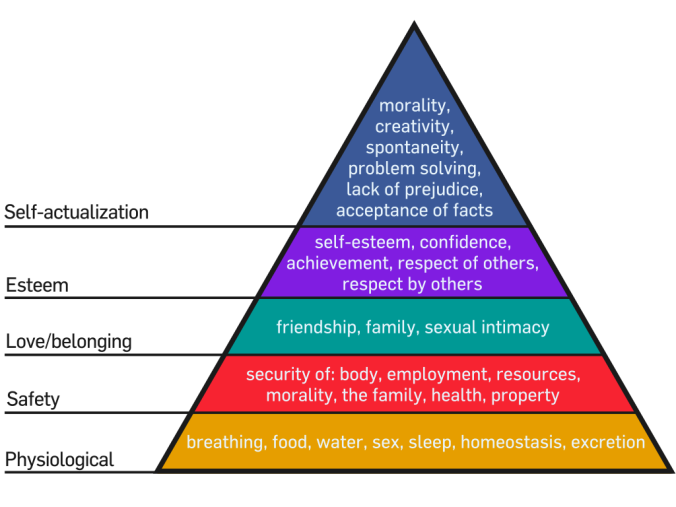In honor of the upcoming Adventure Writing Contest that starts the end of February (click here for more info) I want to help writers by offering info and websites that will hopefully help us all be better writers.
That’s the goal.
Today we’re going to look at Maslow’s Hierarchy of Needs (click here for more detailed information from simplypsychology.org). Maslow originally published this motivational theory back in 1943, then I believe it was updated in 1954. This is a psychological look at what motivates humans from our most basic needs up.
But maybe you’re wondering what this has to do with writing fiction? A lot actually, and it could go a long way to helping write better, more believable characters whose behaviors are directly related to their motivations and deepest needs.

The chart above is meant to be read from the bottom up. Our most basic needs must be met, at least satisfactorily, before our focus shifts to higher levels. Originally the chart’s bottom level focused primarily on food, water, warmth, and rest.
When writing a character, are those four basic needs being met? Are any of them being interfered with? If so, what does this mean for your character’s behavior? As an example: if he is starving, what is he willing to do? How far will he go to get food? Maybe think about this even if he’s not starving so you at least know to what lengths he’d go in crisis.
All the needs on a particular level do not have to be met 100% to have a person put focus into higher levels, but the less they are met the less energy and ability one has to focus on the upper reaches of the pyramid.
What is your character’s level of safety and security? Does she live alone? Is she a child? Is your character lost in the woods? A military vet who suffers PTSD?
Does your character have intimate relationships (including family) or friendships? What do those relationships mean to him or her? Does he feel so unsafe around others that he struggles with intimate relationships, can’t bring himself to talk to family and runs at the idea of building deep friendships?
Or is she one of those people who can’t imagine not having lots of family and friends close by? One who easily commits to a serious relationship without fear of it all falling apart?
Are your character’s most basic and psychological needs being met to the point that her self-esteem is intact? Does he have confidence in his abilities and/or respect for his fellow humans? Does she respect herself? Do others esteem and respect her?
If all the needs below are met, at least in part, how much confidence does your character have? How does he interact with others based on that level of confidence? Is he kind, humble, helpful? Or is he judgmental, always comparing himself to someone else? Wondering what others think of him in a negative light?
At the top of the pyramid we find what is generally termed self-fulfillment needs. It is here that we are able to focus our energies on achieving our full potential, including in creative endeavors. Morality and acceptance of others seems to fall into this category as well.
What does this mean for you character? How committed is she to seeking personal growth? Does she work to be better first for herself and then for others? Personally, I believe the pinnacle of our existence is living to help others, so beyond making sure your character’s own needs are met, do they strive to meet the needs of those around them? Do they look to use their gifts to bring joy and peace to the world at large?
Maslow’s Hierarchy of Needs is a great place to start to get a feel for what kind of person your protagonist or main character is. If you don’t mind taking the time to think of these needs, at least a little, there’s a good chance you’ll be able to flesh out your people in more depth and make sure their actions and the consequences that ensue are based on believable motivations.
Thanks for reading along! If you have questions or need more resources to better understand the topic, feel free to ask.
Here are a couple helpful websites:
- Simply Psychology: Maslow’s Hierarchy of Needs
- Dragon Writing Prompts: Maslow’s Hierarchy of Needs for Writers
And don’t forget to check out the information about the upcoming Adventure Writing Contest!

If you like writing adventure, scifi, and/or fantasy, this contest might be just for you. You’ll write a 1,000 to 5,000 word short story using the above image for inspiration. Do your characters or the setting have to look like this? NO! But get a sense of the feel of the image. Bonus if you can include a setting in your fictional story that could remind the reader of the image you see here.

Please leave a comment, question, or idea! I’d love to chat!